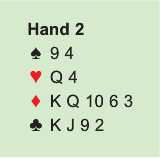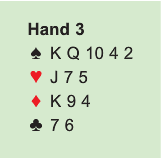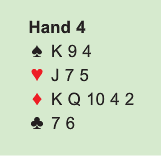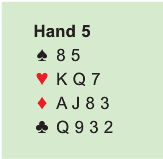Source: Mr Bridge
How do you decide whether to open the bidding in fourth seat? It’s a funny question really. Why should it differ from any other position?
We are probably used to having some different rules about whether we open and what we open with marginal hands —perhaps the rule of 20 or the rule of 22. Whatever we do, we often open a bit lighter in third seat because partner has already passed and we might make an opponent’s life just a bit more difficult.
If we are undisciplined in first seat, we may put the opponents off but partner may be the one with a good hand and not appreciate our marginal pre-empt. Likewise, we often hear that the time to be soundest is in second position when vulnerable. This is because the danger of a penalty is high and partner has not yet had a chance to call.
So there are tactics according to position just as much as according to vulnerability. In the last seat, some openings are no longer sensible. For example, opening a three-level pre-emptive bid to keep the opponents out is silly when passing is sure to keep them out.
A three-level opening in fourth seat is constructive. Many who play weak twos in the majors, showing 5-9 points, change what they do in fourth seat. Perhaps they play strong twos or make their weak twos the strength of an opening bid. It is a good idea to know what you and your partner do in this position.
Anyway, let’s get back to the main issue. What do you open with these hands after three passes?
 |
 |
Assuming you would open 1 on hand 1, why wouldn’t you open 1
on hand 1, why wouldn’t you open 1 on hand 2?
on hand 2?
I would always open 1 with the first hand, but think carefully about the second and probably pass. The reason for this is that, with hand 1, we hold the highest ranked suit and opening will make it quite hard for the opponents to come in. Even if they do come in, we will be able to outbid them at the same level should they compete and we have a fit. On the second hand, if I open 1
with the first hand, but think carefully about the second and probably pass. The reason for this is that, with hand 1, we hold the highest ranked suit and opening will make it quite hard for the opponents to come in. Even if they do come in, we will be able to outbid them at the same level should they compete and we have a fit. On the second hand, if I open 1 I have given my left-hand opponent an easy entry into the auction if he has a five-card major. If he does come in and his partner has something of a fit, they will outbid us and may win the contract in two or three of a major. Judge this for yourself:
I have given my left-hand opponent an easy entry into the auction if he has a five-card major. If he does come in and his partner has something of a fit, they will outbid us and may win the contract in two or three of a major. Judge this for yourself:

You deal and pass and, after two more passes, your right-hand opponent opens 1 in fourth seat. You would overcall 1
in fourth seat. You would overcall 1 wouldn’t you?
wouldn’t you?

You deal and pass and, after two more passes, your right-hand opponent opens 1 in fourth seat. Would you overcall 2
in fourth seat. Would you overcall 2 ? You might, but it is unsound and dangerous to do so at least, in part., because you must proceed to the two level to do so. The risk of conceding a penalty is higher at this level.
? You might, but it is unsound and dangerous to do so at least, in part., because you must proceed to the two level to do so. The risk of conceding a penalty is higher at this level.
How do you decide when to open? This is where the ‘Rule of 15’ comes in. It applies when you are in fourth seat after three passes. You add your number of high card points to your number of spades. If the answer is 15+, you open the bidding. If it is 14 or fewer, you pass. Like most rules of this nature, it is intended only as a guideline to help when you have a marginal hand. Say you hold the following hand:

In the fourth seat, after three passes you might decide to pass it out because points plus spades adds up to 14. You may be on your own if you play at a club at which the common method is to play a weak no trump and nobody else has read this article. From time to time, the cards will fall in such a way that 1NT makes and you get a poor score. Rather more often, you will notice that many of the players sitting in your direction concede 100 or 200 because they go down — or they may concede 110 because their opponents have got together in spades. At least, if you do decide to open 1NT, you force your opponents to come in at the two level —but it is still worth giving a thought to whether you should pass.
Esta entrada también está disponible en: Spanish

